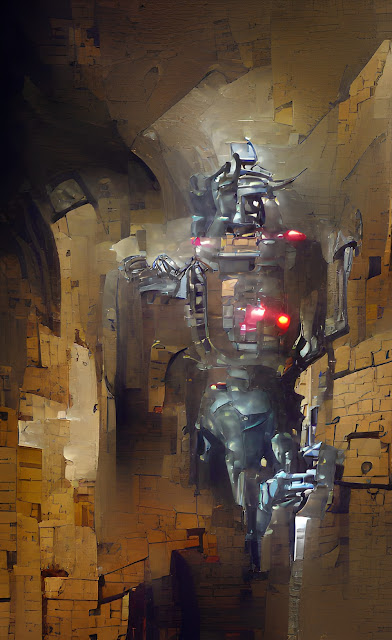I have enough writing experience in different contexts – from professional settings to blogging to tabletop games – that I’m confident saying that editing is the most criminally underrated part of writing.
I understand why. Writing itself is enjoyable. Turning ideas into words. That’s the fun part. Editing is work.
But it’s valuable work. Removing a single bad idea is as useful as adding 10 good ones. Excising an unnecessary sentence is as helpful as writing a brand new paragraph. Scrapping an entire section that wasn’t pulling its weight could save an entire project.
So, Dungeon 23.
Cut from the Bottom
Spending five minutes a day on Dungeon 23 produces some fast, zany, madcap results. They look pretty good fresh out of the oven. But in the cold light of February, some of those January dungeon rooms looked pretty bad.
So, we edit. At the end of every month, find the least-interesting ideas and cut them. For example…
Move the robots off the surface. Several of our rooms suggested that the reptile ancien regime fled from a surface society inhabited by robots. But these robots were incongruous; they didn’t really make sense. And they strictly limited how the dungeon could be incorporated in a game. Let’s move the robots deeper into the dungeon, rather than implying a surface setting we’re not interested in building. Our surface world can now be any normal, nominally human-settled civilization in a fantasy world.
Scrub out fixed scenarios. One of our rooms described a painted person examining the decapitated head of a robot from a nearby mechanical corpse. It was less a room, and more of a frozen tableau, a flash-frozen scene ready to play out when the players walk in on it. This kind of event fits better on a random encounter table than as a dungeon room.
Room to Breathe
I crafted my dungeon day-to-day, drawing heavily on the generator. Drawing on a 5.5’ by 3.5’ notebook, the rooms inevitably were tightly packed together.
The reptilian ancien regime, the petrogeists, the surface-dwelling robots humans, the painted people and their summoned angel of light, and the sundry unaligned monsters were squeezed into relatively tight proximity. This is a known issue with otherwise excellent dungeons that try to compress an intriguing scenario into a too-small space of tightly keyed rooms.
Fortunately – because this particular Dungeon 23 project is merely a very rough draft – I can go back through these rooms and stretch out the proceedings, adding longer hallways, additional rooms, and obstructions and blockages to suggest a more believable shared dungeonscape between the factions.
The First Culling of Many
To return to the subject of writing versus editing… how many editing passes does it take to turn draft writing into a finished product?
“It depends,” but something like…
- A single editing pass for a text message or a DM to a friend.
- Two or three passes for a Discord post or a tweet.
- Four to six thorough reviews for a blog post (I will concede I sometimes fall short, and regret it when I re-read something later and see something I need to fix).
- Ten? More? Could it ever be too many? For something you will put your name on and publish for strangers to read.
In a way, a published module (adventure, whatever you like to call it) is the hardest thing to sufficiently edit. A TTRPG product is attempting to do double duty as not just an interesting fictional scenario, but also a practical tool for use at the table. Imagine combining the writing tasks of “short story” and “furniture assembly instruction manual” into one job.
I suspect a lot of creative people hate editing. Writing itself is the fun part, right? Encountering the ideas themselves in the wild and shaping them into tangible things others can enjoy.
Maybe you hate editing. That’s fine if you are a successful writer with a dedicated editor who can take on that work for you. But most people don’t have that luxury. Not bloggers, not independent publishers, certainly not homebrewing DMs. You are your own best editor. So embrace the value of editing. Even if it feels like work. Especially if it feels like work. Because it will pay off.





No comments:
Post a Comment